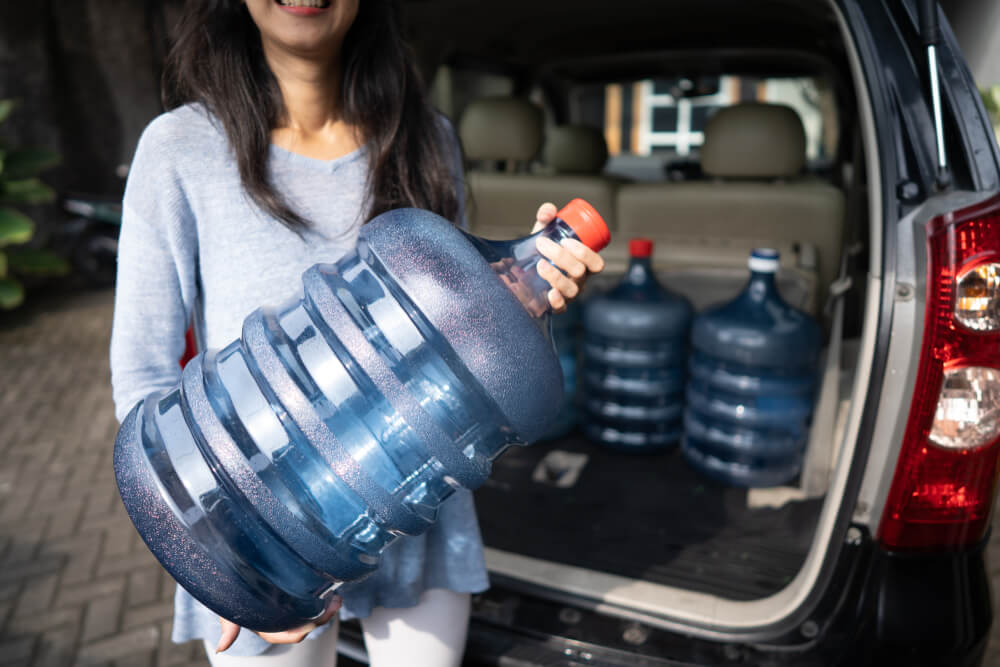Water is the lifeblood of us all. It’s the drink we take for granted but is the purest form of hydration that you need. As you rush off to grab your 8-ounce glass, don’t forget to grab a gallon for your car! Er, you read that correctly….. Your car can benefit from water just as much as you in a pinch! Here are the main reasons you should always keep at least a gallon of water in your vehicle.
Keep a Gallon of Water in Your Car for Emergencies
Anyone who drives knows that cars will eventually experience a hiccup and break down. Depending on the season, an auto breakdown can be disastrous, leaving you stranded in the freezing cold or blaring heat for an hour or more.
If your car breaks down far from home or between long stretches to the nearest gas station, you’ll want water to keep yourself hydrated while you wait for or walk to help.
As we’ve said, water is a necessity. It regulates your temperature, lubricates your joints, and keeps your heart pumping efficiently.
We suggest keeping a gallon jug in your car or a package of water bottles in your trunk in case your car battery dies or the engine fails. You can rest easier knowing that if your car dies, you can keep cool until help arrives.
Where to Put Water in a Car?
What good does H2O do for your vehicle? Believe it or not, you can put water in a car when it is overheating.
Radiator
An overheating car can be a scary experience for any driver. Most of these issues stem from low coolant in your radiator. If you don’t have coolant available, you can use water to help cool the engine down.
After you’ve turned off the vehicle and it’s cooled down, remove the pressure cap, add water to the radiator to prevent engine overheating, and call for roadside assistance to get coolant in your vehicle as soon as possible.
Coolant Reservoir or Recovery Tank
If your car is overheating to the point of steam, you can add water to the coolant reservoir or recovery tank. This should only be done in emergencies when you don’t have coolant. We also suggest using distilled water that is clear of minerals and mitigates electrolysis and deposit formation.
Car Battery
Pouring water directly on a car battery is not recommended. When sulfuric acid inside the battery is combined with water, it creates dangerous hydrogen gas.
If your battery dies and you have a hydrometer and battery charger on hand, water can help. If, after using the hydrometer, the battery’s electrolyte level is low, filling the cells with distilled water can assist in recharging the battery.
A Gallon of Water Adds Weight to your Car
So, you know the value of keeping water in your car for hydration and emergency radiator issues. But did you know that a few gallons of water in your car can help you in the colder months in Irving?
Smaller, lightweight cars slide easily on icy roads in wintry conditions. Keeping a few gallons in your car offers added weight, giving your car more traction for a safer drive. The average gallon of water weighs around 8 pounds. Toss a few gallons in the back of your car for added traction on icy roads.
Can a Car Run on Water?
While we agree that water is a lifeline to keeping us running, a car cannot run on water.
However, keeping a gallon of water in your car can help you stay hydrated in a vehicular emergency, keep your car weighed down in icy conditions, and prevent overheating in a pinch.
If your vehicle recently overheated and needed emergency water, it’s time to check in at Irving’s Kwik Kar for radiator repair, new battery replacement, or a coolant flush. Schedule your auto services with Kwik Kar today!




